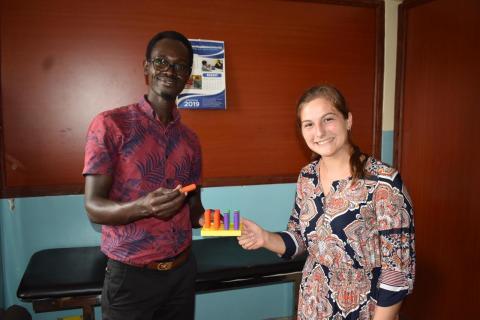Lucy Spicher (pronounced “spiker”), who is on the verge of completing dual degrees in Biomedical and Mechanical Engineering, has used her engineering skills to serve patients and hospitals in rural Kenya, but she wasn’t always so sure of herself or her engineering skills.
She credits the Spark Program, offered through Undergraduate Research and Fellowships Mentoring (URFM), for inspiring her to pursue opportunities that may otherwise have seemed out of reach.
“Coming from a high school with just 46 students, I didn’t have a lot of confidence when I first arrived at Penn State, and I wasn’t sure how I fit into the realm of academic research,” said Spicher. “The Spark Program made those opportunities seem more attainable.”
Since participating in the program during her freshman year, Spicher has engaged in extensive undergraduate research through Kijenzi, a social business venture launched by two Penn State engineers which uses 3D printing technology to produce medical devices for rural Kenyan hospitals. Spicher spent the summer after her sophomore year in Kenya, leading Kijenzi’s efforts to produce in-demand occupational therapy tools. Her work benefitted individuals who were recovering from accidents and those suffering from cognitive diseases and disorders such as cerebral palsy, stroke, and autism.
From Kijenzi’s home base, a “makerspace” filled with 3D printers, she created splints, braces, sensory stimulation tools, muscle memory devices, and other tools specifically tailored to the needs of individual patients, including—most memorably for Spicher—a four-month-old baby who had suffered serious burns on his hands. After meeting the patient and his mother and assessing the infant’s needs, Spicher designed a device that would keep his hands open as they healed. She credits the experience, and others like it, for accelerating her growth as an engineer.
“Seeing my designs directly impact people’s lives confirmed that engineering is what I want to be doing, and it really bolstered my confidence in a field that has historically had very few women,” said Spicher.
Her work with Kijenzi has since led to further opportunities. She applied for and won the 2020 Dr. John P. Karidis Department Head’s Award for Research Achievement in Mechanical Engineering, which recognizes one Penn State mechanical engineering undergraduate each year for outstanding achievements in undergraduate research. She also landed an internship with KeyTech, a biomedical device company based in Baltimore, during the summer of 2020. Spicher has also held leadership roles with the Society of Women Engineers and the Women and Engineering Program in the College of Engineering.
With plans to graduate in spring 2021, Spicher is keeping her post-graduation plans open, but she hopes to continue her medical device research in one capacity or another, either in private industry or graduate school. Reflecting on her Penn State career, she is proud of the opportunities she has seized and that were introduced to her through URFM.
“Without URFM and the Spark Program, I wouldn’t have understood the full range of opportunities available to me as a Penn State student,” she said. “I feel that I’ve truly made the most of my time here, and I can’t wait to see where my education will take me.”


